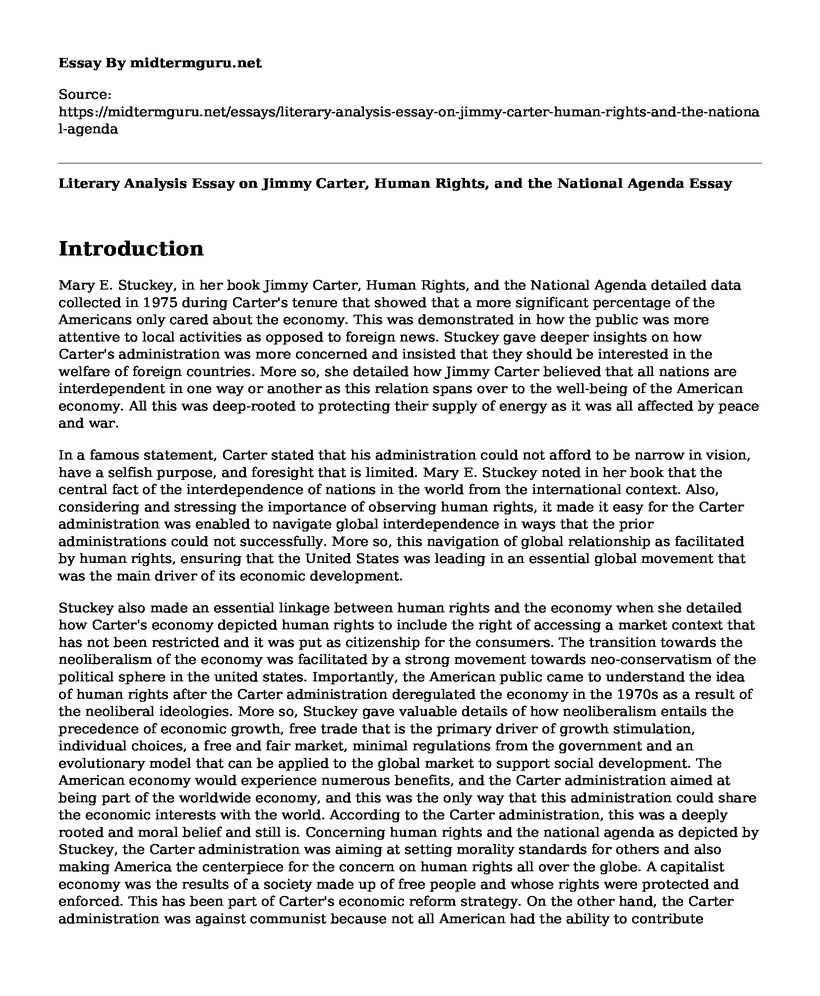Introduction
Mary E. Stuckey, in her book Jimmy Carter, Human Rights, and the National Agenda detailed data collected in 1975 during Carter's tenure that showed that a more significant percentage of the Americans only cared about the economy. This was demonstrated in how the public was more attentive to local activities as opposed to foreign news. Stuckey gave deeper insights on how Carter's administration was more concerned and insisted that they should be interested in the welfare of foreign countries. More so, she detailed how Jimmy Carter believed that all nations are interdependent in one way or another as this relation spans over to the well-being of the American economy. All this was deep-rooted to protecting their supply of energy as it was all affected by peace and war.
In a famous statement, Carter stated that his administration could not afford to be narrow in vision, have a selfish purpose, and foresight that is limited. Mary E. Stuckey noted in her book that the central fact of the interdependence of nations in the world from the international context. Also, considering and stressing the importance of observing human rights, it made it easy for the Carter administration was enabled to navigate global interdependence in ways that the prior administrations could not successfully. More so, this navigation of global relationship as facilitated by human rights, ensuring that the United States was leading in an essential global movement that was the main driver of its economic development.
Stuckey also made an essential linkage between human rights and the economy when she detailed how Carter's economy depicted human rights to include the right of accessing a market context that has not been restricted and it was put as citizenship for the consumers. The transition towards the neoliberalism of the economy was facilitated by a strong movement towards neo-conservatism of the political sphere in the united states. Importantly, the American public came to understand the idea of human rights after the Carter administration deregulated the economy in the 1970s as a result of the neoliberal ideologies. More so, Stuckey gave valuable details of how neoliberalism entails the precedence of economic growth, free trade that is the primary driver of growth stimulation, individual choices, a free and fair market, minimal regulations from the government and an evolutionary model that can be applied to the global market to support social development. The American economy would experience numerous benefits, and the Carter administration aimed at being part of the worldwide economy, and this was the only way that this administration could share the economic interests with the world. According to the Carter administration, this was a deeply rooted and moral belief and still is. Concerning human rights and the national agenda as depicted by Stuckey, the Carter administration was aiming at setting morality standards for others and also making America the centerpiece for the concern on human rights all over the globe. A capitalist economy was the results of a society made up of free people and whose rights were protected and enforced. This has been part of Carter's economic reform strategy. On the other hand, the Carter administration was against communist because not all American had the ability to contribute equally, and others had more needs as compared to others.
At long last, Stuckey evaluates how the U.S. government has systematized human rights. She takes note of that Carter was not the first president to push a human rights agenda; he offered permeability and course to prior endeavors in Congress. His arrangement needs and policies prompted the advancement of different...
Cite this page
Literary Analysis Essay on Jimmy Carter, Human Rights, and the National Agenda. (2023, Jan 25). Retrieved from https://midtermguru.com/essays/literary-analysis-essay-on-jimmy-carter-human-rights-and-the-national-agenda
If you are the original author of this essay and no longer wish to have it published on the midtermguru.com website, please click below to request its removal:
- Analysis of William Shakespeares Tragedy Othello - Paper Example
- Literature Essay Example: The Power of Death and Nature in Poems
- Critical Analysis of Theories: A Doll's House - Literature Essay Sample
- Critical Essay King Lear: Doube Pots
- Literary Analysis Essay on Beowulf
- Literary Analysis Essay on Macbeth: Imagery
- Character Analysis of Pearl In The Scarlet Letter By Nathaniel Hawthorne







